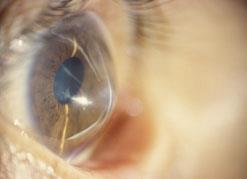Keratoconus is an eye condition that occurs when the corneal shape is distorted over time. Instead of being round, the cornea is oblong; this process generally starts when a person is in their late teenage years or early twenties and can continue for years. As keratoconus progresses, the cornea becomes weaker and starts to swell or bulge; this is called ectasia. When the process ends, the corneal shape is established. Depending on how long the process took, a patient may have mild or severe symptoms with vision impairment.
Symptoms may start with slight blurring or vision distortion. Clouding vision in one eye that clears over a period of time can also occur suddenly, this is called acute hydrops. This happens as a result of the quick infusion of fluid into the stretched cornea from the keratoconus process.
 Prescription eyeglasses can correct mild keratoconus symptoms that occur as a result of the ectasia. However, frequent changes to the prescription are necessary, especially if the disease continues to progress. Gas-permeable contact lenses are the preferred method of treatment, especially if the development of ectasia occurred for a lengthy amount of time. Gas-permeable contact lenses are worn by the patient as a lifelong treatment for keratoconus. It is imperative that individuals with keratoconus have regular vision checkups after diagnosis and lens fitting to ensure vision correction is optimal. Technology is always changing and there are frequent medical advances with regard to both soft lenses and gas-permeable lenses, another reason consistent checkups are crucial. Other options for treatment with contact lenses are: scleral contact lenses, hybrid contact lenses, and the placement of two lenses on top of each other.
Prescription eyeglasses can correct mild keratoconus symptoms that occur as a result of the ectasia. However, frequent changes to the prescription are necessary, especially if the disease continues to progress. Gas-permeable contact lenses are the preferred method of treatment, especially if the development of ectasia occurred for a lengthy amount of time. Gas-permeable contact lenses are worn by the patient as a lifelong treatment for keratoconus. It is imperative that individuals with keratoconus have regular vision checkups after diagnosis and lens fitting to ensure vision correction is optimal. Technology is always changing and there are frequent medical advances with regard to both soft lenses and gas-permeable lenses, another reason consistent checkups are crucial. Other options for treatment with contact lenses are: scleral contact lenses, hybrid contact lenses, and the placement of two lenses on top of each other.
At NY LASIK, with locations in Brooklyn, Queens and Manhattan, we offer Corneal Collagen Cross-Linking (CXL). Corneal collagen cross-linking (CXL) is another method of treatment for progressive keratoconus with mild or moderate symptoms. CXL works by strengthening the cornea with riboflavin, a type of vitamin B12, followed by UV-A light treatment that slows and can even stop advancement of keratoconus. Surgery may be necessary if vision correction and patient comfort is not sufficient with contact lenses.